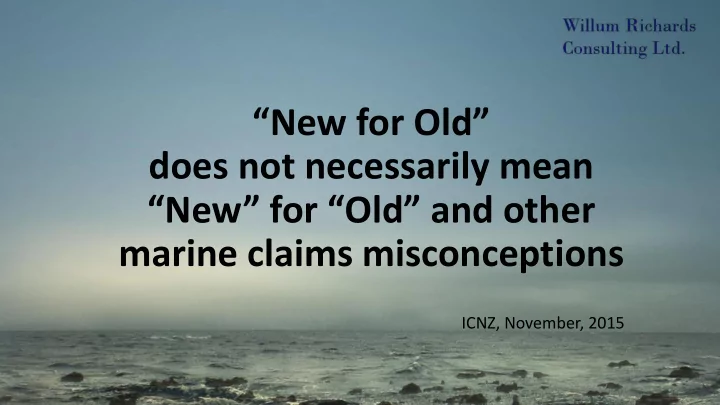

“New for Old” does not necessarily mean “New” for “Old” and other marine claims misconceptions ICNZ, November, 2015
Association of f Average Adju justers Two levels of membership by examination: Associate A1 Marine Insurance Act 1906 and related principals A2 Hull and Cargo claims Fellow F1 General Average, Salvage and Carriage of Goods by Sea F2 Hull Claims, including Loss of Hire F3 Collision liabilities, ancillary insurances on ship, cargo claims and miscellaneous F4 Practical adjustment paper For details: www. average-adjusters.com
Agenda 1. “New for Old” 2. Perils of the Sea 3. General Average
“New for Old” “I can buy a new, up -to-date engine because I cannot get spares for my damaged 30 year old one and it therefore cannot be repaired – Yippee!!!” ITC (Hulls) 1.10.83 Clause 14: “Claims payable without deduction new for old” a. Why? b. What does it mean? Reasonable cost of repairs (MIA,1909 Section 75a) Versloot v HDI (2013)
Perils of f the Sea Only covers really heavy weather and freak conditions. MIA, 1909 (Rule of Construction 7) “The term “perils of the seas” refers only to fortuitous accidents or casualties of the seas. It does not include the ordinary action of the winds and waves”. 1. “fortuitous” “La Pointe” (1991) Supreme Court of Canada. “ Popi M” (1985) 2. “….of the seas”. How much “sea” is necessary? Stott (Baltic) v Martin (1916) – Boiler fell whilst being hoisted on to vessel. / “ Inchmaree ” Versloot v HDI (2013) Rain during typhoon
General Average only involves big container ships
What is needed for a GA? Y.A Rule A (1994) “There is a general average act when, and only when, any extraordinary sacrifice or expenditure is intentionally and reasonably made or incurred for the common safety for the purpose or preserving from peril the property involved in a common maritime adventure”. Requirements: 1. Peril / common safety 2. Intentional / voluntary action (Australian Coastal Shipping Comm. v Green (1971)) 3. Actions must be reasonable 4. “Common Adventure” (ITC (Hulls) 1.10.83 – Clause 11.3) 5. Success
Why important / relevant? 1. Should some of the damage / expense be shared with the cargo / charterers? 2. Can the Owners claim more in GA that they could with a standard damage (Particular Average) claim?
GA or not GA? 1. Small coastal ferry (value NZ$ 500,000) and with NZ$ 250,000 of trucks and goods board runs aground. Damage is sustained to the vessel’s bottom and port rudder but the vessel simply refloats on the high tide and continues the voyage having secured the port rudder. When next in port, the vessel is slipped and repairs done. GA? 2. If the vessel vessel did not refloat on the high tide by herself but had to work her engines and thereby did damage to the port propeller and additional damage to the bottom when reversing off the shoal. GA? 3. Tourist excursion boat travelling with no cargo / passengers from Kaikoura to Lyttelton for maintenance suffers an engine breakdown and is towed back to Kaikoura. Following a weeks worth of part permanent and temporary repairs repairs, the vessel is fit to continue her voyage to Lyttelton where the repairs completed during the routine maintenance slipping. GA?
Thank you Questions?
Recommend
More recommend